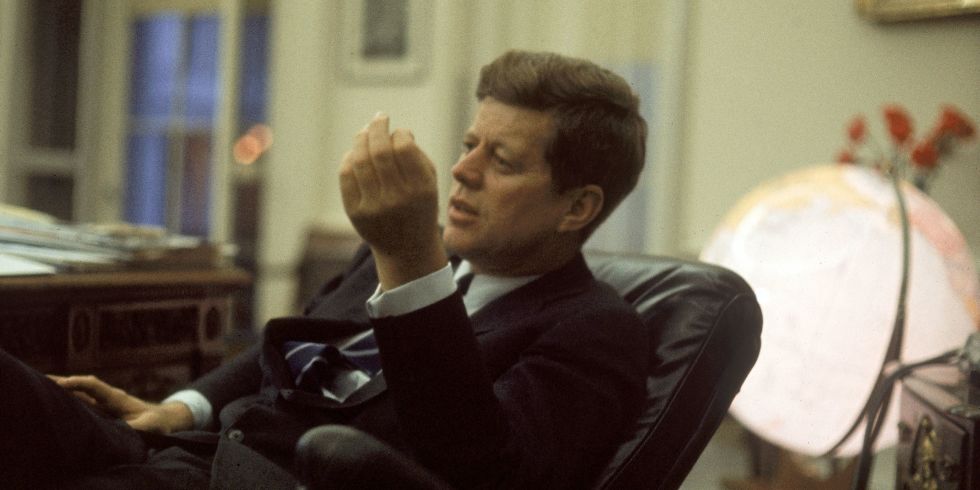On Thursday evening, the National Archives released some of the secret records relating to the 1963 assassination of President John F. Kennedy, narrowly making a legally mandated deadline established in 1992 by President H.W. Bush. President Trump blocked the release of others because of concerns from the FBI and CIA. He placed those files under a six-month review while letting the 2,800 others come out Thursday.
As ABC News notes, the documents often include raw intelligence reports that aren’t verified or backed up, so it’s important to take them with a grain of salt. But they reveal a fascinating look into the communications that government officials had surrounding the assassination and its aftermath. And it’s certain to be catnip for those who believe conspiracy theories surrounding the tragedy.
Here’s what we have learned so far from the newly released files.
A journalist got a tip about “big news” 25 minutes before Kennedy’s assassination.
One of the files released was a memo to the director of the FBI, from November 26, 1963, about a call received by the Cambridge News on November 22. According to the memo, the caller said that “the Cambridge News reporter should call the American Embassy in London for some big news, and then hung up.” The memo says Britain’s MI5 intelligence service calculated that the call came 25 minutes before Kennedy was shot in Dallas.
Anna Savva, a current Cambridge News reporter, told the Associated Press the paper had no record of who took the call. She said Friday that learning of the call was “completely jaw-dropping.”
Lee Harvey Oswald called the KGB’s department of “sabotage and assassinations.”
According to Business Insider, a document shows the CIA intercepted a call Lee Harvey Oswald made to the Soviet embassy in Mexico City. The call reveals he visited the embassy a few days before, specifically meeting with an officer who was in the KGB department “responsible for sabotage and assassination.” The call happened a month before the JFK assassination, and he apparently asked if there was “anything new concerning the telegram to Washington.” The agent said there was not. The document speculates Oswald was looking to defect to the Soviet Union and wanted to check into passport and visa issues.
The Soviet Union thought the killing was a plot by the American right.
NPR reports that a memo from J. Edgar Hoover to a special assistant to President Johnson related intelligence that people in the Soviet Union were shocked and saddened by Kennedy’s death, and church bells rang in his honor. According to Hoover’s source, Communist Party officials thought the killing was a conspiracy from the “ultraright” in the United States. The goal, they thought, was to stir up anti-communist sentiment to get support to take military action against the Soviet Union and Cuba. The same officials said Oswald had no connection to the Soviet Union, and called him “a neurotic maniac who was disloyal to his own country and everything else.”
The CIA worked on multiple plots to bring down the Castro regime in Cuba.
CNN reports a document from 1975 showed that the Attorney General at the time of Kennedy’s assassination—JFK’s brother Robert Kennedy—learned the CIA hired someone to approach mobster Sam Giancana with a proposition: to hire a gunman to travel to Cuba and kill Fidel Castro, all for the price of $150,000. The CIA was also interested in using the mafia to get Castro to take a poison pill.
But that wasn’t the only document that revealed plots to bring down Castro. According to NPR, documents show there were plans to drop propaganda leaflets via balloons, disrupt radio and television programming, destroying Cuba’s economy, and use “biological agents” to kill crops.
It only got weirder from there. The Washington Examiner reports that the U.S. considered a number of bizarre methods to kill the Cuban leader, from a booby-trapped seashell that would explode while he went diving to a contaminated diving suit to offering Cubans a two-cent bounty on his head.
The FBI was desperate for a confession from Oswald.
According to ABC News, a memo from Hoover dated just hours after Jack Ruby shot Lee Harvey Oswald reflected how much the FBI wanted Oswald to confess to the assassination. But they never did, and Hoover wanted “something issued so that we can convince the public that Oswald is the real assassin.” They also noted that the night before Ruby shot Oswald, the FBI’s Dallas office received a call from a man saying he was part of a committee to kill Oswald, but despite their warnings to local police, the killing took place.
The Associated Press contributed to this report.













